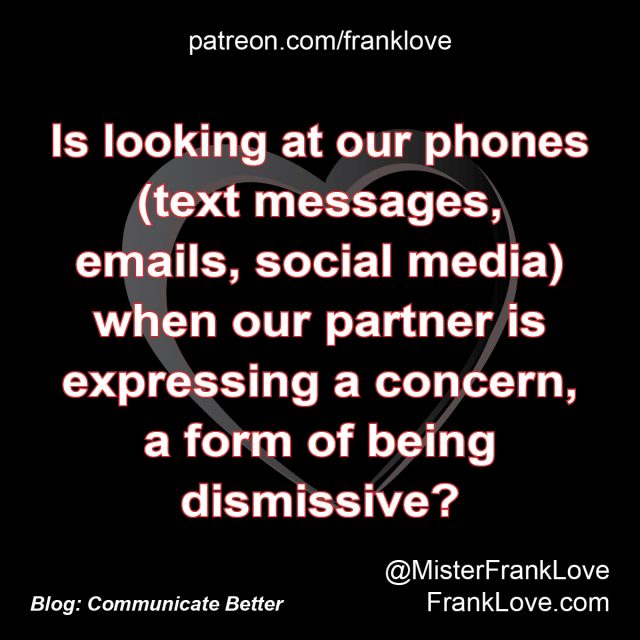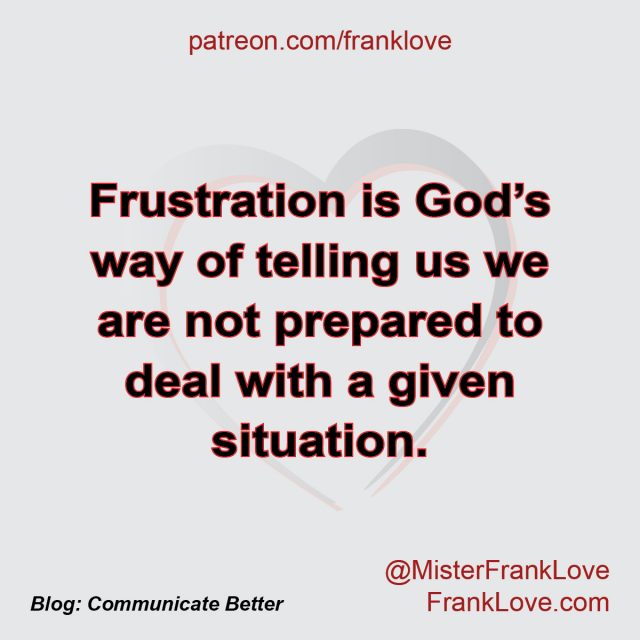In my previous blog post “Upon Father Reflection,” I talked about how my father lost a valuable relationship because he was not mindful in sharing his opinion with his friend. Remember, when considering carelessly expressing ourselves, a better approach is to temper our words to support the relationship.
_____________________________________

A few days ago over dinner, I received a dose of therapy from a good friend. As I discussed the communication challenges I was working through, she promptly checked me on quite a few places where my framing and language were potentially contributing to the issue. It was great, productive–and at times, hilarious. She was helping me step up my game.
With that experience in mind, here are six fundamentals to help us work through challenging conversations with our partner. When we are talking to our partner, attempting to connect and be connected with, let’s remind ourselves of these important fundamentals.
1. Frustration Teaches Us Awareness
Frustration is God’s way of telling us we are not prepared to deal with a given situation. This is important to understand because this admission is empowering. Whomever we are talking to and whatever we are doing, if we find ourselves frustrated, we are simultaneously getting a message from God. God is telling us there is work for us to do.
There may be work for our partner to do, too. However, that is not under our control. Once we accept that God is delivering a message, it is our responsibility to do the work. That work is figuring out where we are ill-prepared, which skills we need to develop, or what perspective we need to adjust. It is a powerful awareness, and the conversation with God is insightful and intimate.
2. Conversations Are Learning Opportunities
What does frustration have to do with relationships and conversations with our partner? When we find ourselves frustrated in our dealings with one another, that’s a good time to take a pause and concede that we need to change something. It may involve any of the other fundamentals on this list or maybe even something else. Instead of staying frustrated, pass through frustration right to calmness and a learning mindset.
There can be a fine line between frustration and defensiveness. However, they are different. When defensive, we are working to protect ourselves. This disposition is destructive when working with our partner. It occurs when we believe that we have to protect ourselves from them. Our partner becomes the enemy; we are no longer working together to resolve an issue with the wisdom that both parties bring forth. We revert tO posturing and positioning ourselves to be victorious. Here’s an example of this dynamic.
In this two-line communication, Jordan is not responding to River’s issue with an interest in addressing it. Jordan appears to feel attacked and is responding with a defensive comment. Consider the following instead.
Instead of being defensive (which can cause you to go on the offensive), be open. Openness is important even when we believe our partner is attacking us or when they are being defensive. Jordan’s question may be asked to gain information to use in order to argue. But positively, it can be asked to explore the issue with curiosity. Let’s explore the issue with curiosity.
If we are one of those people who gather information in order to argue, let’s test ourselves by being quiet. After asking “Would you tell me more about that?” and getting a response, let’s sit with the answer. No more questions. We can make a few notes and give ourselves some time to consider the response. We may even want to write a paragraph or a page about our understanding of what has been shared. Not a response to it, but our understanding of it. If we are unable to do this, it is likely that we are more invested in arguing than we are in understanding.
3. Pay Attention to the Volume
It is important that we keep our volume at a moderate level when we are discussing challenging issues with our partner. It is easy for our message to get lost if we are yelling or mumbling. Our partner may tune us out or focus on a tangential issue if we speak in a manner that is perceived as an attack, disrespectful, insensitive, or avoidant.
4. Be Attentive
Dismissiveness communicates that we do not care about our partner or what they are saying. There are degrees of dismissiveness. They are not all of equal importance, depending on the person and the couple. However, they are all destructive. Ideally, we want to weed out dismissiveness in all forms as we talk to and work with our partner.
The opposite of dismissive is being attentive. And if we commit to being and remaining attentive to our partner, their needs, and their message, we won’t have to worry about the degree of dismissiveness.
Dismissive Actions to Avoid
For example, looking at email on our phone in the middle of a conversation may feel like the equivalent of walking away from our partner while they are talking. Talking to others (as a side conversation) when discussing something in a partner’s presence or even if we are on the phone with our partners can be considered dismissive. Multitasking or walking away or around while our partner is talking to us may also be considered dismissive. Let’s avoid these gray areas by being attentive.
Affirming our partner and what they are saying becomes a goal of our communication. If we are intent on having a positive and productive conversation with our partner, we don’t have to give them our attention, we get to. We get to listen intently (while doing nothing else) to what our partner is saying to us. We get to confirm our understanding by paraphrasing whatever our partner has just shared. We get to make affirming our partner an actual goal.
5. Speak in Moderation:
In an effort to relay how passionate we are about a given issue, and sometimes to win, many of us exaggerate our reasoning or points. The use of words like always and never when we are talking about something we do or they do is a form of exaggeration (see “Always” “Never” Wins). It is not productive, and it’s an indicator that we are more interested in winning an argument or conversation than we are in addressing and resolving the issue.
Instead of using exaggerated language, let’s maintain moderation. “There are times when you leave your clothes on the floor,” instead of, “You always leave your clothes on the floor.” Instead of, “You never show me appreciation,” or “You don’t show me any appreciation,” consider, “I would like to feel more appreciated.”
Expressing discontent is fine, particularly when we are working through it. However, let’s do so with love and moderation.
6. Own the Experience:
In the spirit of recycling, the same example that I have given to support Speaking in Moderation can be used for owning our own experiences too. Instead of, “You never show me appreciation,” or, “You don’t show me any appreciation,” consider, “I would like to feel more appreciated.” There is a difference between noting how we feel and what our partner is doing. “I would like us to have sex more” is different from “You don’t have sex with me enough.” The former is expressing a subjective preference. The latter is more of an accusation. We are accusing our partner of doing something wrong or substandard.
When we approach or discuss an issue with our partner, it is important that we make our connection paramount. Our connection gets to be honored and respected. When we own the experience, we are saying to our partner, “You are not wrong. And I am not invested or interested in making you wrong. However, I do wish to share my preference with you.”
_____________________________________
As we all work to create a loving culture in our relationships, let’s keep in mind the aforementioned opportunities to improve communication.

Each of us can improve these skills so that they are the foundation of our communication with our partner–at every moment and in every conversation. If we embrace these fundamentals, there is a high probability that we are influencing our partner to do the same. Remember: it doesn’t take two, it just takes you.
Keep Rising,
Frank Love
In my next blog post “The Superpower of Support, Part II” I discuss the value of supporting our partners even if we disagree with them. Check it out.
—–—–—–—–—–—–—–—–—–—––
Watch Frank Love’s presentation “The Act of Caring.”
Subscribe to receive Frank’s weekly blog.
Become a sponsor of Frank Love and his work creating loving cultures in our relationships with a monthly contribution of as little as $2. Sign up today at Patreon.com/FrankLove.
—–—–—–—–—–—–—–—–—–—––
Each week, Frank Love hosts Zoom support group meetings that assist women and men as we work to create a loving culture in our relationships. Calls occur from 7 p.m. to 8:30 p.m. EST and can be accessed by visiting FrankWeeklyCall.com.
- Tuesdays—Black Women: Creating a Loving Culture in Our Relationships
- Thursdays—Black Men: Creating a Loving Culture in Our Relationships
–—–—–—–—–—–—–—–—–—–—–
Frank Love coaches individuals toward creating a loving culture in their family. He is also the author of Relationship Conversations You Don’t Want to Have (But Should Anyway) and 25 Ways to Be Loving. To schedule a free consultation, contact Frank at Frank@FrankLove.com.
Questions to Embed
Communication improvement tips Effective relationship communication Frank Love communication advice Reducing frustration in conversations Tips for better connection Improving relationship dynamics Overcoming communication challenges Mindful expression in relationships Frustration as a learning opportunity Building intimacy through communication Relationship therapy insights Positive communication strategies Frank’s guide to better conversations How to avoid defensive communication The importance of being attentive Managing dismissiveness in relationships Tips for active listening in relationships Strategies for open communication Moderate volume in discussions Communicating with love and moderation Effective expression of discontent Owning personal experiences in communication Frank Love’s communication fundamentals Navigating challenging conversations Curiosity in addressing relationship issues Enhancing communication skills Relationship-building through effective communication Resolving conflicts with curiosity Techniques for positive communication Nurturing a loving culture in relationships Creating connection through conversation Importance of self-awareness in communication Relationship growth through dialogue The power of pausing in conversations Communicating with intention and purpose Building a strong foundation for communication Strategies for better partner communication Mindful expression in relationships Connecting through shared experiences Improving dialogue with your partner Effective communication for couples Communication awareness in relationships Strengthening emotional connections Building trust through communication Conversational skills for healthy relationships Techniques for resolving relationship issues Active listening for relationship success Overcoming communication obstacles Tips for effective relationship dialogue Improving communication dynamics with partners Fostering understanding in relationships Relationship enrichment through better communication Strategies for resolving misunderstandings Navigating difficult conversations with ease Positive communication habits for couples Enhancing emotional intimacy through words Dialogue improvement in relationships Techniques for expressing preferences in relationships Mindful conversation for lasting connections Strengthening bonds through effective communication

